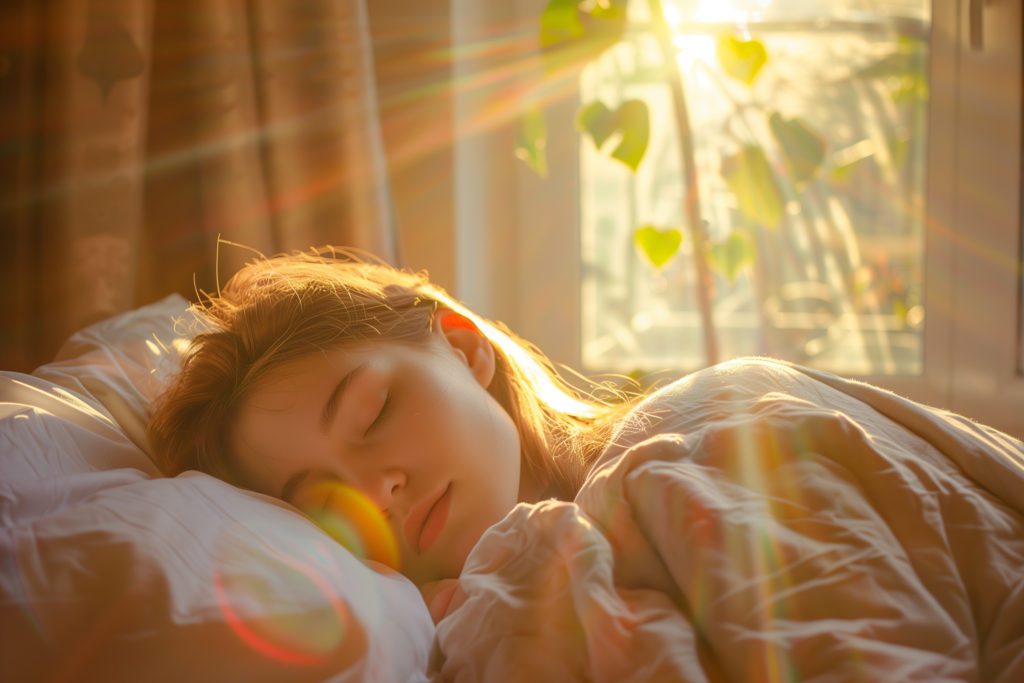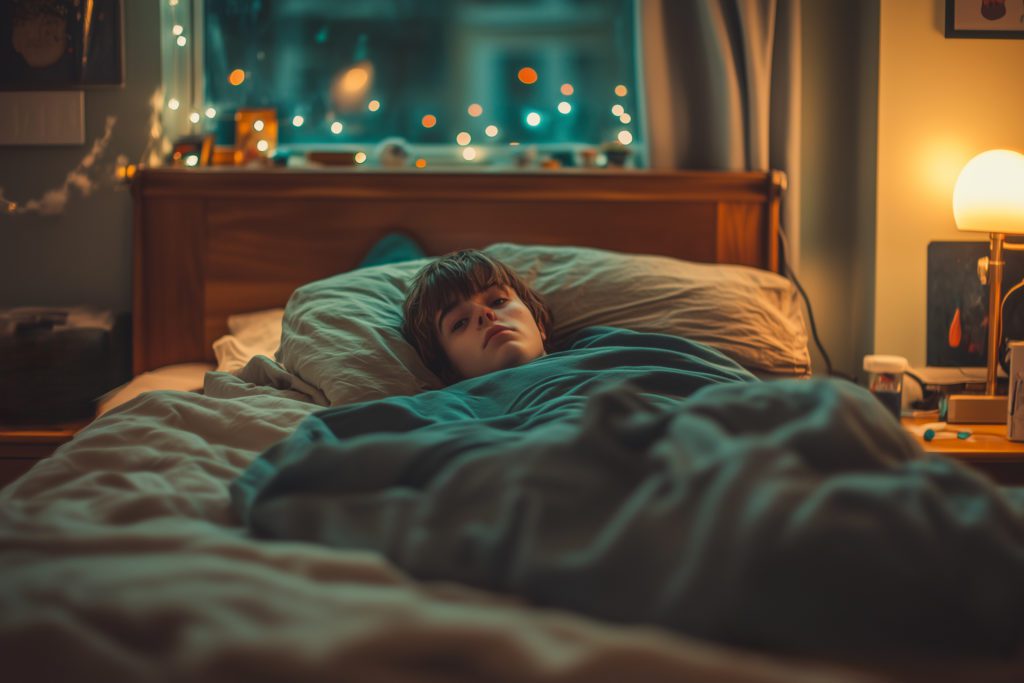
ADHD and Circadian Rhythm Disorders – What’s the Link?
Ever wondered how ADHD affects sleep? Explore how disruptions in circadian rhythms can turn nights into a challenge and discover strategies for better rest.

Learn how ADHD amplifies sleep issues, plus strategies for better rest
It's 2 a.m. Instead of sleeping, you're replaying conversations from that day or planning tomorrow, despite feeling physically spent. This restless night isn't rare—it's your norm if you have ADHD, a condition increasingly diagnosed as awareness grows.
But why is sleep so elusive? The answer often lies in a disrupted circadian rhythm, which skews the natural cycle of alertness and restfulness. For those with ADHD, understanding this link is important—not just for better sleep, but for better overall well-being.
Let’s explore the dynamic between ADHD and circadian rhythm disorders, shedding light on why nights are long and what you can do about it.
- Those with ADHD often find it hard to fall asleep and stay asleep because of racing thoughts.
- Conditions like DSPS and ASPS throw off normal sleep times, making it tough to fall asleep at a usual hour.
- Many people with ADHD naturally go to bed late and struggle to wake up early, which makes their symptoms worse and daily life harder.
- Poor sleep linked to ADHD can lead to mood swings and overall health troubles.
- Set a regular sleep schedule using sleep tracking apps, make your sleeping area comfortable, try relaxation techniques before bed, check how ADHD medications affect sleep, and consult a doctor if sleep problems continue.
How does ADHD impact sleep?
ADHD, or Attention Deficit Hyperactivity Disorder, is a neurological condition characterized by difficulty maintaining attention, hyperactivity, and impulsive behavior. It affects both children and adults, influencing school, work, and personal relationships. Beyond these day-to-day challenges, ADHD often extends its impact to the night, troubling the sleep of those affected.
People with ADHD frequently face a range of sleep-related issues. Difficulty falling asleep is common, as the mind tends to race with thoughts and ideas when it’s time to wind down. This problem is compounded by an inability to stay asleep; many with ADHD experience restless nights, waking up several times and struggling to return to sleep. Additionally, the overall quality of sleep is often poor, leading to non-restorative sleep that doesn’t provide the needed rest and recovery.
These sleep challenges are not just nighttime issues—they spill over into daytime functioning, exacerbating ADHD symptoms like lack of focus and increased impulsivity. The cycle of poor sleep and challenging days creates a feedback loop that can significantly affect health and quality of life. Such disrupted sleep patterns may often be symptomatic of deeper regulatory issues, potentially linked to circadian rhythm disorders.
What are circadian rhythm disorders?
The circadian rhythm is like the conductor of an orchestra, setting the tempo for our body’s biological processes, including when we feel the urge to sleep and when we’re all systems go.
So, what happens when the conductor loses the beat? You get circadian rhythm disorders, where your body’s internal clock and the world outside just can’t seem to sync up. This means battling eyelids that refuse to stay shut at 1 a.m. or feeling irresistibly sleepy when it’s barely sunset.
For those juggling ADHD, it’s like having a double whammy. Their already erratic sleep patterns get an extra shake-up from disorders like Delayed Sleep Phase Syndrome (DSPS), where the night just drags on, or Advanced Sleep Phase Syndrome (ASPS), which prompts absurdly early wake-up calls.
This mismatch complicates life beyond tiredness; it amplifies ADHD symptoms and can throw daily routines out of whack. Working through this demands a strategic approach to realign our biological clocks with our environmental cues, ensuring that sleep comes naturally and daytime alertness follows.
The link between ADHD and circadian rhythm disorders
There’s a fascinating, yet challenging overlap between ADHD and disruptions in circadian rhythms that researchers are just beginning to understand. Turns out, many individuals with ADHD naturally operate on a delayed schedule—meaning their internal clocks nudge them to hit the hay later and sleep in longer than most. This kind of "time lag" fundamentally jumbles the usual sleep-wake cycle.
When you mix ADHD’s typical high-energy, easily distracted traits with off-kilter sleep patterns, you’re bound to see a spike in daytime challenges. Imagine trying to match your peak alertness with a 9-to-5 schedule when your brain thinks it's still early morning. This misalignment can crank up ADHD symptoms like lack of focus, impulsivity, and that ever-present restlessness.
Beyond making daily tasks tougher, this constant out-of-sync feeling can lead to bigger health issues down the road, like mood swings, weight gain, and even heart trouble. Syncing the body’s internal clock with the world around us not only helps smooth out ADHD symptoms but also boosts overall health.
Strategies for better sleep for individuals with ADHD
Securing quality sleep with both ADHD and circadian rhythm disorders can be tricky, but with the right strategies, you can find a rhythm that works for you. Here are some practical tips:
- Establish a routine. Consistency is key. Try to go to bed and wake up at the same time every day, even on weekends. This helps train your internal clock to expect sleep at certain times.
- Optimize your sleep environment. Keep your bedroom cool, dark, and quiet. Invest in blackout curtains or a white noise machine if necessary to create a space conducive to sleep.
- Use a sleep tracking app. If sticking to a sleep routine sounds like a tall order, a sleep tracking app acts as a personal sleep coach in your pocket. With handy reminders to wind down and hit the hay, they’re perfect for anyone who finds consistency a bit tricky.
- Mindful relaxation techniques. Before bed, engage in activities that promote relaxation such as meditation, deep breathing, or gentle yoga. These can ease the transition to sleep, especially for minds that tend to race.
- Review medications. If you’re on medication for ADHD, discuss how they might be impacting your sleep with your healthcare provider. Adjustments might be necessary to minimize sleep disturbances.
- Seek professional guidance: If sleep issues persist despite your best efforts, consult a sleep specialist or your healthcare provider. They can offer tailored advice and explore other treatment options.
Remember, managing sleep with ADHD and circadian rhythm disorders is a journey, and small, consistent changes can lead to big improvements over time.
Finding your sleep sweet spot with ADHD
Getting on top of your sleep game can make a world of difference, especially when you're dealing with ADHD and wonky circadian rhythms. Integrating smart tools like sleep tracking apps can make these tasks less daunting by reminding you when it's bedtime, helping establish those all-important routines—even though your brain may be telling you otherwise. Good sleep leads to better days, and who doesn't want that? Take control of your sleep to set yourself up for success, both at night and during the day.
FAQ
Are children with ADHD also prone to sleep problems?
Yes, children with ADHD often struggle with falling asleep, staying asleep, and waking up feeling refreshed. Sleep disturbances in children can lead to behavioral challenges, increased hyperactivity, and difficulties in school performance, making sleep management a priority.
Is there a connection between ADHD and circadian rhythm disorders?
Research shows that individuals with ADHD often experience delayed circadian rhythms, meaning their natural sleep-wake cycle is shifted, leading to difficulty falling asleep at conventional times and feeling alert later in the evening, which can result in chronic sleep deprivation.
How does anxiety related to ADHD contribute to sleep disturbances?
Anxiety, which frequently coexists with ADHD, can lead to racing thoughts and increased bedtime arousal, making it difficult to relax and fall asleep. This heightened state of alertness can result in insomnia and further sleep fragmentation, worsening ADHD symptoms.
Can ADHD medications impact sleep quality?
Stimulant medications, commonly prescribed for ADHD, can cause difficulty falling asleep, reduced sleep duration, and fragmented sleep if taken too late in the day. Non-stimulant medications or timing adjustments may help mitigate these effects while still managing ADHD symptoms effectively.
What role does screen time play in sleep problems for individuals with ADHD?
Excessive screen time, especially before bed, can delay melatonin production and overstimulate the brain, making it harder for individuals with ADHD to wind down. Blue light exposure can further disrupt circadian rhythms, worsening sleep latency and overall sleep quality.
How does physical activity impact sleep in people with ADHD?
Regular physical activity can improve sleep quality by helping to regulate energy levels and reduce hyperactivity. However, intense exercise too close to bedtime can have the opposite effect, making it harder to fall asleep due to increased adrenaline and heart rate.
Can mindfulness and relaxation techniques help with sleep issues in ADHD?
Yes, techniques such as mindfulness meditation, deep breathing, and progressive muscle relaxation can help calm the racing thoughts and restlessness associated with ADHD, making it easier to fall asleep and stay asleep throughout the night.

Written by
Georgia Austin
Professionally trained copywriter, editor, and content marketing strategist with over 7 years of experience—working with brands like Nike, Siemens, Toshiba, Tommy Hilfiger, Culture Trip, and Klook.
Download Pillow
Get help
Press & News
Legal
Connect
X (Twitter)
Company
Copyright © Neybox Digital Ltd.



